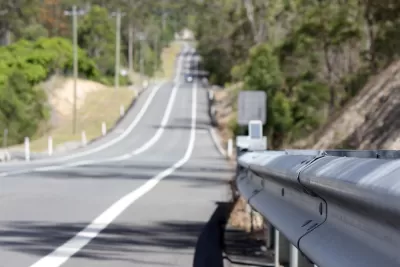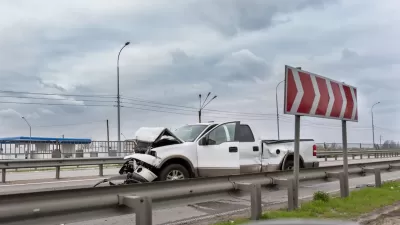After five deaths, several states have stopped installing FHWA-approved guardrails which have been said "to turn into spears" when hit by vehicles. An Oct. 20 jury verdict awarded $175 million to a whistleblower to be paid by the rail manufacturer.

Danielle Ivory and Aaron M. Kessler report on the ongoing investigation of guardrails manufactured by Dallas-based Trinity Industries, centering on a design change they made in 2005.
"Federal highway officials had long insisted that guardrails throughout the state were safe," they write. "But some guardrail heads had apparently malfunctioned, in essence turning the rails into spears when cars hit them and injuring people instead of cushioning the blow, Missouri officials said."
Because of its safety concerns, Missouri banned further installation of the rail heads on Sept. 24. It joined Nevada, which prohibited further purchases in January, and was followed six days later by Massachusetts. Lawsuits say the guardrails were to blame for five deaths, and many more injuries, in at least 14 accidents nationwide.
While "(t)he Federal Highway Administration (FHWA), the agency charged with ensuring the safety of the nation’s roads, continues to say that the guardrails, installed on highways in almost every state, meet crash-test criteria," write Ivory and Kessler, the result of a jury trial on Monday, October 20 may lead many to question that assertion.
ABC news reports that Trinity "made false statements to the government relating to a nearly decade-old modification that critics say made the guardrails more dangerous for motorists across the country, and ordered the company to pay $175 million in damages."
According to The Wall Street Journal [subscription], "(i)t is unclear how much Trinity Industries will have to pay. Damages are usually tripled under the federal rules that govern whistleblower procedures..." Ivory and Kessler draw comparisons to "the National Highway Traffic Safety Administration, a federal agency separate from the Federal Highway Administration, (that) failed to act on multiple reports of faulty ignitions in cars made by General Motors, a defect linked to at least 24 deaths."
In both instances, questions are being raised about the close ties between federal safety agencies and the companies they are charged with overseeing. The internal communications at the Federal Highway Administration show that (FHWA senior engineer) Nicholas Artimovich endorsed the Trinity guardrails after meeting privately with company officials and being assured the tests were adequate.
Correspondent's note: To understand how the guardrails are supposed to operate after a vehicle hits the "end terminal," and photos of actual crash scenes, readers are encouraged to view the ABC News video.
FULL STORY: Highway Guardrail May Be Deadly, States Say

Study: Maui’s Plan to Convert Vacation Rentals to Long-Term Housing Could Cause Nearly $1 Billion Economic Loss
The plan would reduce visitor accommodation by 25,% resulting in 1,900 jobs lost.

North Texas Transit Leaders Tout Benefits of TOD for Growing Region
At a summit focused on transit-oriented development, policymakers discussed how North Texas’ expanded light rail system can serve as a tool for economic growth.

Why Should We Subsidize Public Transportation?
Many public transit agencies face financial stress due to rising costs, declining fare revenue, and declining subsidies. Transit advocates must provide a strong business case for increasing public transit funding.

How to Make US Trains Faster
Changes to boarding platforms and a switch to electric trains could improve U.S. passenger rail service without the added cost of high-speed rail.

Columbia’s Revitalized ‘Loop’ Is a Hub for Local Entrepreneurs
A focus on small businesses is helping a commercial corridor in Columbia, Missouri thrive.

Invasive Insect Threatens Minnesota’s Ash Forests
The Emerald Ash Borer is a rapidly spreading invasive pest threatening Minnesota’s ash trees, and homeowners are encouraged to plant diverse replacement species, avoid moving ash firewood, and monitor for signs of infestation.
Urban Design for Planners 1: Software Tools
This six-course series explores essential urban design concepts using open source software and equips planners with the tools they need to participate fully in the urban design process.
Planning for Universal Design
Learn the tools for implementing Universal Design in planning regulations.
Ascent Environmental
Borough of Carlisle
Institute for Housing and Urban Development Studies (IHS)
City of Grandview
Harvard GSD Executive Education
Toledo-Lucas County Plan Commissions
Salt Lake City
NYU Wagner Graduate School of Public Service





























